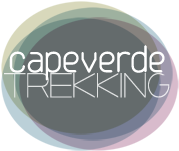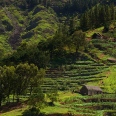


capeverdetrekking.com

USEFUL INFO
Security
While Cape Verde is generally a safe country, cities like Praia and Mindelo have experienced sporadic episodes in the past, where petty crime disturbs the usual serenity - therefore, we appeal to your common sense.Thus, at night, you want go by taxi. In these cities, we recommend not carrying large amount of money with you - there is no need to have thousands of Euros in your pocket. Instead, leave valuables in the safe of your hotel room. Similarly, you will only need your Passport at the bank, airport and the reception of the hotels. The rest of the time, it is not necessary to carry it with you.
Entry requirements
Since January 2019, the EU and UK nationals are exempted from visa requirements for short stays (up to 30 days).Travelers have to register on the official site a few days before departure and pay a new tax (31 EUR) on this site (only capeverdeans citizens are exempted).
We invite you to consult the information published on this site to know how to obtain your visa: www.capeverde-visa.com.
Do you search the Cape Verdean consulate of your country of residence? See the list here.
To pack in your suitcase
» sandals» light clothing
» swimsuit
» a towel (small hotels or pensions do not always have towels - and if they do, it takes a lot of water and elbow grease to wash them afterwards - so be kind and use your own :)
» a k-way (from July to October)
» sun protection (sun screen + hat + sunglasses)
» moisturising cream in case of a sun burn
» travel pharmacy (medicines used in diarrhoea, headaches, disinfectant, dressings etc), personal medications
» copy of the passport, vaccination cards and airplane tickets If you are hiking:
» day backpack (30 to 40 litres)
» trekking shoes
» flashlight
» 1 L water bottle - try to avoid buying the 1.5 L bottles, instead group together, if possible, to buy a 5 L canister. Ask for either "Vale das Ribeiras" or "Trindade", the Cape Verdean bottled water companies; the other brands are imported from Europe. Why not help the Cape Verdean industry, the spring water here is just fine :)
Good to know
PhoneFrom anywhere to Cape Verde: 00238
From Cape Verde to the UK: 0044
... to the USA: 01
... to Sweden: 0046
... to the Netherlands: 0031
... to Germany: 0049
... to North-Korea: 00850
and so on :)
Electricity
220 V / 50 Hz: same as in Western Europe (France, Germany, Portugal...). If you're from the UK, the Italy, the USA or Papua New Guinea, you'd better bring an adaptor.
Time difference: GMT-1
» in winter: when it's 10am in Mindelo, it's 6am in the Hamptons, 11am according to Big Ben and 10pm in Vladivostok.
» in summer: when it's 10am in Praia, it's 7am at the Empire State Building, 12pm in London and 10pm in Pyongyang.
The language
The official language is Portuguese, but people speak Creole between each other. Cape Verdean Creole is a mix of Portuguese and African languages, seasoned with English, Spanish and French words here and there. There are important differences within the islands, especially between the Northern and the Southern islands. Many Cape Verdeans speak english: they either lived in USA or UK for a while, or learned english at school.A quick phrase-book:
| Good Morning Good Afternoon Good Evening Good night | Bom dia Boa Tard Boa Noït? (Boa noyt) Boa Noït? (Boa noyt) |
| How you doing? | Tud dret? (tewd' drayt'?) |
| Thanks | Obrigad |
| My name is... | Nha nome é... (nee-a nome é) |
Pens, sweets, money
As to avoid an automatic reaction among the youth (such as: white tourist = free stuff), we implore you NOT to give anything to the children you'll encounter, unless it is your most beautiful smile.If you still want to give things, pick useful (pens, notebooks) over frivolous (sweets) and give them to your guide, to the local agency or to teachers, who will gather donations until there is enough for each student of one school.
Again, we ask you never to give money to children. Never.
Weather
The weather is simply delightful: temperatures average between 24°C and 30°C - the sea is just a tiny bit less warm :)A light humidity and the influence of winds make the somewhat high temperatures very tolerable; the highest peaks are between August and October, when the wind is less strong.
So no need to pack those moonboots! Bring many light clothing, but don't forget a little jumper: at night (and in high altitude), it can be chilly.
Security
While Cape Verde is generally a safe country, cities like Praia and Mindelo have experienced sporadic episodes in the past, where petty crime disturbs the usual serenity - therefore, we appeal to your common sense.Thus, at night, you want go by taxi. In these cities, we recommend not carrying large amount of money with you - there is no need to have thousands of Euros in your pocket. Instead, leave valuables in the safe of your hotel room. Similarly, you will only need your Passport at the bank, airport and the reception of the hotels. The rest of the time, it is not necessary to carry it with you.
Changing money
The most practical is to exchange EUR upon arrival at the airport, or in town at one of the following banks: the BCA (blue logo), the Caixa Economica (green logo) or the BCN (purple logo, less crowded than its competitors but not present on all the islands).Bank hours are 08:00 to 15:00 Monday through Friday.
The fixed exchange rate is 1 EUR = 110,265 CVE (Cape Verdean Escudos), but in most stores or in taxis the rate is 1 EUR = 100 ECV.
Traveller's checks are not recommended because of their extremely high costs.
As of January 2014, $1 (USA) = 81 CVE ; £1 (UK) = 132 CVE. Please check for more recent rates.
Credit cards are not accepted in most establishments, but you can draw money out at ATMs called Vinti4. You should bring a VISA, as Mastercards are less accepted (usually, only in some major hotels).
If not included in our proposal, meals cost about 20 EUR per person, per day: it depends on the island, the season and of course your appetite :).
Please keep in mind that you'll not be able to change CVE outside Cape Verde: so spend it while you're here.
Tipping
In a country with a fragile economy, a small tip is always welcome - though not required. If you are satisfied with the service, a tip of 5 to 10% of the meal is always welcome.Eating in Cape Verde
In the Middle of the Atlantic, you'll find lots of fish, including tuna (atum), wahoo fish (serra), grouper (garoupa) and almaco jack (esmoregal) in your meals. Seafood and lobster are specialties of the country but please, we're begging you, make sure you comply with the designated prohibited period from July to October allowing for the endangered lobsters to reproduce.The national dish is the cachupa (pronounced catchoupa) - a mixture of corn and beans. This is a soup, but is also very very good heated up in the morning with onions and eggs (cachupa guisod).
Beer (Estrela), wine (grown on the island of Fogo), and national spirits can be found everywhere; the local rum is called grog, the less aggressive liquor is pontche when the spirit is mixed with cane molasses or different fruit juices.
Drink only water purchased in bottles (remember the brands? "Vale das Ribeiras" and "Trindade" come from natural Cape Verdean springs and are more than fine) and not from the tap. Ice cubes are sometimes made with tap water; try to avoid them (but worry less if they are immersed in alcohol :).
The rule for fruits is: cook it, peel it or forget it, unless you feel like testing out your immune system. Salads and fruits found in restaurants are washed with a little bleach water to disinfect (this is roughly what is being done in Europe without be told so) - when in doubt, ask the restaurant.
Your selection








